Nsg 6420 quiz 1 - Study guides, Class notes & Summaries
Looking for the best study guides, study notes and summaries about Nsg 6420 quiz 1? On this page you'll find 291 study documents about Nsg 6420 quiz 1.
Page 3 out of 291 results
Sort by
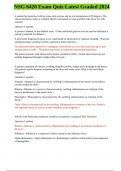
-
NSG 6420 Exam Quiz Latest Graded 2024
- Exam (elaborations) • 4 pages • 2024
- Available in package deal
-
- $13.49
- + learn more
NSG 6420 Exam Quiz Latest Graded 2024. A patient has presented with an acute otitis externa and an oral temperature of 99 degrees. The nurse practitioner orders a complete blood count based on what possible risks factor for otitis externa? Question 1 options: A patient’s diabetic or pre-diabetic state. <Urine and blood glucose tests are used to determine a patient’s potential for diabetes.> A previously diagnosed trauma to ear canal based on obstruction or vigorous cleaning. <...
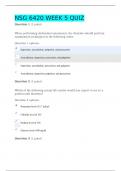
-
NSG 6420 WEEK 5 QUIZ
- Exam (elaborations) • 3 pages • 2024
-
- $9.99
- + learn more
NSG 6420 WEEK 5 QUIZ Question 1 (1 point) When performing abdominal assessment, the clinician should perform examination techniques in the following order: Question 1 options: Inspection, auscultation, palpation, and percussion Auscultation, inspection, percussion, and palpation Inspection, auscultation, percussion, and palpation Auscultation, inspection, palpation, and percussion Question 2 (1 point) Which of the following serum lab results would you expect to ...
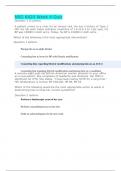
-
NSG 6420 Week 4 Quiz
- Exam (elaborations) • 6 pages • 2024
-
- $12.09
- + learn more
NSG 6420 Week 4 Quiz Question 1 (2 points) A patient comes to a clinic for an annual visit. He has a history of Type 2 DM. His lab work today indicates creatinine of 1.6 (0.6–1.5). Last year, his BP was 138/80 in both arms. Today, his BP is 150/80 in both arms. Which of the following is the most appropriate intervention? Question 1 options: Question 2 (2 points) A seventy-eight-year-old African American woman presents to your office as a new patient. She complains of headach...
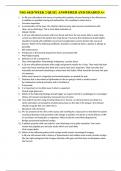
-
NSG 6420 WEEK 2 QUIZ| ANSWERED AND GRADED A+
- Exam (elaborations) • 6 pages • 2024
-
- $11.49
- + learn more
NSG 6420 WEEK 2 QUIZ| ANSWERED AND GRADED A+ 1. An 86 year old patient who wears a hearing aid complains of poor hearing in the affected ear. In addition to possible hearing aid malfunction, this condition is often due to - Cerumen impaction 2. In examination of the nose, the clinician observes gray pale mucuous membranes with clear, serous discharge. This is most likely indicative of - Allergic rhinitis 3. A 45 year old patient presents with sore throat and fever for one week. After a qui...
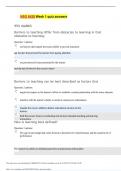
-
NSG 6420 Week 1 quiz answers
- Exam (elaborations) • 9 pages • 2024
-
- $12.79
- + learn more
NSG 6420 Week 1 quiz answers 95% MARKS Barriers to teaching differ from obstacles to learning in that obstacles to learning: Question 1 options: are barriers that impede the nurses ability to provide education are psychosocial issues presented by the learner Barriers to teaching can be best described as factors that Question 2 options: negatively impact on the learner's efforts to establish a mutual partnership with the nurse educator. interfere with the learner...
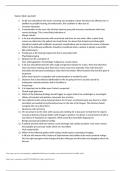
-
NSG 6420 Week 2 Quiz | Latest 2023-2024 | Graded A+
- Exam (elaborations) • 6 pages • 2023
- Available in package deal
-
- $9.99
- + learn more
NSG 6420 Week 2 Quiz | Latest 2023-2024 | Graded A+ 1. An 86 year old patient who wears a hearing aid complains of poor hearing in the affected ear. In addition to possible hearing aid malfunction, this condition is often due to - Cerumen impaction 2. In examination of the nose, the clinician observes gray pale mucuous membranes with clear, serous discharge. This is most likely indicative of - Allergic rhinitis 3. A 45 year old patient presents with sore throat and fever for one week. Aft...
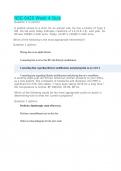
-
NSG 6420 Week 4 Quiz
- Exam (elaborations) • 6 pages • 2024
-
- $12.99
- + learn more
NSG 6420 Week 4 Quiz Question 1 (2 points) A patient comes to a clinic for an annual visit. He has a history of Type 2 DM. His lab work today indicates creatinine of 1.6 (0.6–1.5). Last year, his BP was 138/80 in both arms. Today, his BP is 150/80 in both arms. Which of the following is the most appropriate intervention? Question 1 options: Question 2 (2 points) A seventy-eight-year-old African American woman presents to your office as a new patient. She complains of headach...
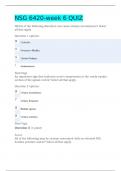
-
NSG 6420-week 6 QUIZ
- Exam (elaborations) • 3 pages • 2024
-
- $9.99
- + learn more
NSG 6420-week 6 QUIZ Which of the following disorders can cause urinary incontinence? Select all that apply Question 1 options: Cystocele Overactive Bladder Uterine Prolapse Endometriosis Next Page An important sign that indicates nerve compression at the cauda equina section of the spinal cord is? Select all that apply. Question 2 options: Urinary incontinence Urinary frequency Bladder spasms Urinary retention Next Page Question 3 (1 point) Saved All ...
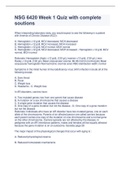
-
NSG 6420 Week 1 Quiz with complete solutions | Latest 2023/2024
- Exam (elaborations) • 5 pages • 2023
- Available in package deal
-
- $9.99
- + learn more
NSG 6420 Week 1 Quiz with complete solutions | Latest 2023/2024
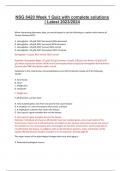
-
NSG 6420 Week 1 Quiz with complete solutions | Latest 2023/2024
- Exam (elaborations) • 5 pages • 2024
-
- $11.99
- + learn more
NSG 6420 Week 1 Quiz with complete solutions | Latest 2023/2024 When interpreting laboratory data, you would expect to see the following in a patient with Anemia of Chronic Disease (ACD): A. Hemoglobin <12 g/dl, MCV decreased, MCH decreased B. Hemoglobin >12 g/dl, MCV increased, MCH increased C. Hemoglobin <12 g/dl, MCV normal, MCH normal D. Hemoglobin >12 g/dl, MCV decreased, MCH increased Hemoglobin <12 g/dl, MCV normal, MCH normal Rationale: Hemoglobin (Hgb): <12 ...

That summary you just bought made someone very happy. Also get paid weekly? Sell your study resources on Stuvia! Discover all about earning on Stuvia


